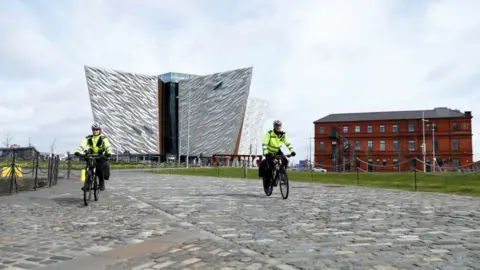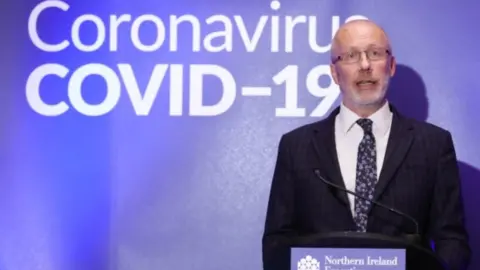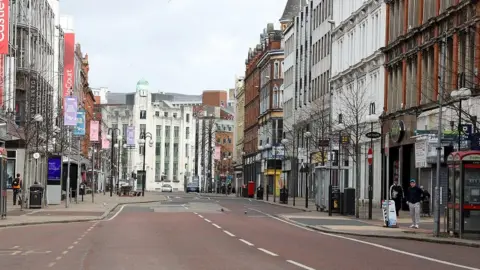Coronavirus: NI outlook positive as curve 'flattens'
 Reuters
ReutersThe curve for cases of Covid-19 in Northern Ireland is flattening and we could soon be on the downward slope, Northern Ireland's chief scientific advisor has said.
If people stick to social distancing regulations, the number of cases may well fall significantly by mid-May, Prof Ian Young told BBC News NI.
Last month, the NI Executive warned 15,000 people could die across Northern Ireland in the first 20 weeks of the pandemic.
Prof Young said it was down to the actions of the public that the projected death toll now looked closer to 1,500.
All the evidence suggested that social distancing measures had been effective and should mean a drop in hospital admissions, he said.
Nine more coronavirus-related deaths were announced by the Department of Health on Tuesday, bringing the number recorded by the Public Health Agency to 216.
Recent reductions in the daily number of hospital admissions as well as the number of deaths suggest that Northern Ireland passed the peak of its outbreak several days ago.
The number of deaths may rise in the next week or so but should then drop, said Prof Young.
"The curve has without a doubt flattened," he said.
'Don't be complacent'
If people remained vigilant, Northern Ireland was looking at a "reasonable best-case scenario" as opposed to a "reasonable worst-case" one, added Prof Young.
 PA Media
PA Media"Compared with the rest of the UK, it's clear we have fewer cases, fewer hospital admissions, fewer deaths.
"We can be pleased with that.
"The hope is that we continue to adhere to the current measures, so that we can say with confidence that we're on the downward slope and it is falling."
The number of cases could fall to a low level by the middle of May, he added, but that depended on people sticking to social distancing rules.

- A SIMPLE GUIDE: How do I protect myself?
- AVOIDING CONTACT: The rules on self-isolation and exercise
- WHAT WE DON'T KNOW How to understand the death toll
- TESTING: Can I get tested for coronavirus?
- LOOK-UP TOOL: Check cases in your area

While the indicators were all good there was no room for complacency, said Prof Young.
"If, on the other hand, the population isn't so good at sticking to social distancing, the numbers could remain quite high until the middle of the summer or even rise a little further," he warned.
"The message is: 'Don't be complacent, what you're doing is making a real difference and it's important to continue.'"
Relaxing rules?
Prof Young said the figures from Northern Ireland suggest that intensive care units have more than likely seen the worst of this Covid-19 wave.
"Hospital admissions and ICU occupancy are probably the two most important pieces of information we have in terms of helping us to model the progress of the epidemic," he said.
 Pacemaker
PacemakerHe said both offered strong signals that social distancing was working.
If those numbers fall steadily and steeply over the next three weeks, this would indicate Northern Ireland was nearing a position to relax restrictions.
In that scenario, BBC News NI understands the executive would look at ways to relax the current lockdown.
By 9 May, it could relax the rules surrounding parks and cemeteries and there is a possibility that shops and cafes would be allowed to reopen.
However, bars and restaurants are considered high-risk and it might take longer for these to open their doors.
Even when businesses are allowed to raise their shutters, the two-metre social distancing rules would still apply.
A significant question is whether there will be an all-island approach to how lockdown restrictions are lifted.
Several scientists and academics have recommended a co-ordinated approach to ending lockdowns in the Republic of Ireland and Northern Ireland would be more effective than easing restrictions at different times.
Whatever the strategy, Prof Young warned that the "new norm" of social distancing would have to continue for many months.
And he added that the threat posed by coronavirus would remain.
"Until we have a high level of population immunity, Covid is going to remain a recurrent and ongoing problem for us all," he said.
